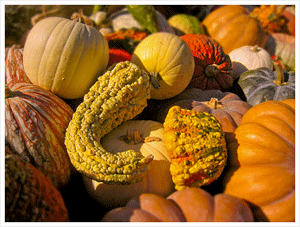Those who relegate winter squash to Thanksgiving decorations are missing out on one of winter's tastiest and healthiest culinary delights. Older adults who sail past squash displays at local groceries and farmers' markets often do so because they find these large, unusually-shaped vegetables intimidating. But squash are actually easy to cook and require only minimal preparation. If you've never cooked a squash, it's time to start!
Why Eat Squash?
Squash are low in calories, cholesterol-free, and packed with healthy vitamins, minerals, fiber, and disease-fighting antioxidants and phytonutrients. Dieticians commonly recommend including squash in your diet if you are trying to lose weight or control cholesterol.
- Yellow and orange winter squash, such as butternut and pumpkin, are extraordinarily high in vitamin A, a powerful antioxidant essential to good eyesight and the maintenance of healthy skin and mucous membranes. Vitamin A may also help protect the body against lung and oral cancer.
- Many varieties of winter squash are also rich in vitamin C and B-complex vitamins.
- Depending on variety, winter squash may also provide essential minerals, including iron, zinc, copper, calcium, potassium, and/or phosphorous.
How to Choose Squash
Heavy weight and smooth, even skin coloring with a dull, dusty cast indicate a mature squash. Avoid squash with a shiny skin as this generally means the vegetable was picked too early. Look for squash with dry, intact stems. Stems that are soft, damp or black may indicate interior rot.
How to Store Squash
Most squash can be stored at room temperature for up to three months if left uncut. Allow adequate air circulation to prevent rot or mold growth. After they are cut, raw squash can be stored in the refrigerator for about a week if kept tightly wrapped.
Join us next time for tips for cooking winter squash. In the meantime, you can find many more ways to remain healthy in our new download, Remaining Active: How to Begin a Regular Exercise Routine.
Photo: Grufnik














